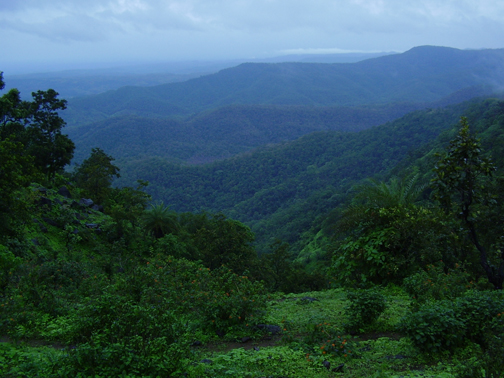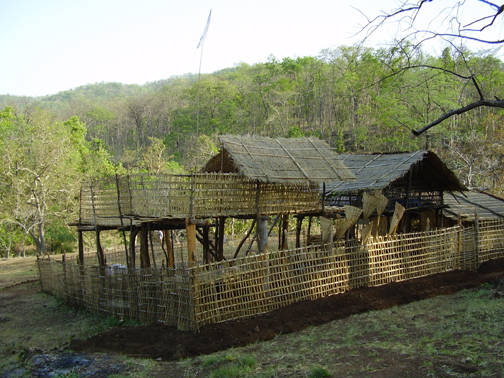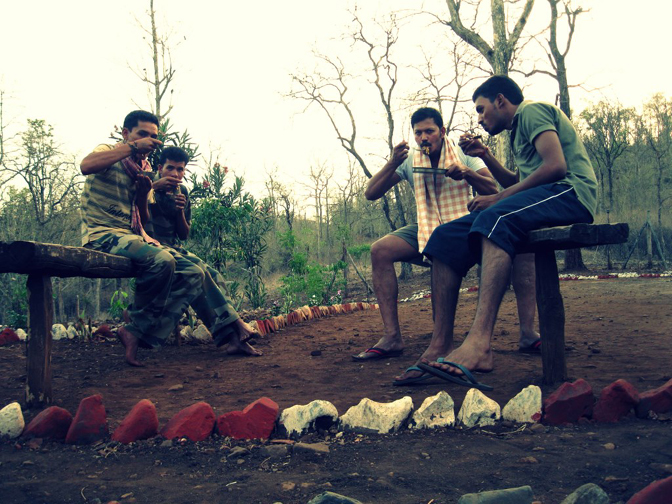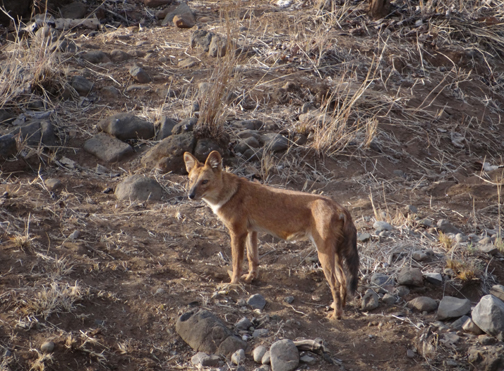Volunteer patrolling – an innovative venture in Melghat Tiger Reserve
Melghat is located in Satpura Hill Range, in Amravati District of Maharashtra, on the border with Madhya Pradesh. It is a wild place with steep hills and deep gorges and valleys. It is also hot and dry, especially in summer, as may be expected in Central
India. Melghat is clad with dry teak-bearing forests of Central India. Melghat is famous for typical central Indian wildlife such as tiger, leopard, wild dog, sloth bear, gaur, sambar, muntjac and four horned antelope Melghat supports equally rich bird life
such as hornbills, woodpeckers, flycatchers, eagles, owls and a diversity of aquatic birds. Melghat is home to central Indian tribes such as Korku, Gond, Thatia, Balai and Gawli.

Earlier Melghat was one of the prime forests for production of Central Indian teak wood. With the announcement of Project Tiger by the Indian Government, for conservation of the tiger and its ecosystem, the Maharashtra Forest Department decided to establish
its first tiger reserve in Melghat. After its declaration as a tiger reserve tree felling was gradually discontinued and the emphasis shifted to wildlife conservation. At present there are about 35 to 40 tigers in Melghat Tiger Reserve.

Sipna Wildlife Division is one of three divisions in Melghat Tiger Reserve. It shares a border with Madhya Pradesh State along the Tapi River. There are several villages in Sipna division and across the border with Madhya Pradesh, which exerts considerable
pressures in the form of tree cutting, fire and occasional poaching. Forest Guards of the tiger reserve patrol the forests regularly to protect against these pressures. However, it is a tough task for a few forest guards to patrol the area given the vast area
and difficult terrain. Considering this Wildlife Research and Conservation Society (WRCS) conceived the volunteer patrolling program to support the forest guards in their patrolling duties.

Involvement of citizens in conservation activities is common outside India where volunteers help in habitat restoration, animal rescue, research studies and data collection. However the concept of volunteer involvement in conservation is relatively new
in India. Involving volunteers in patrolling activities gives them an opportunity to work closely with Forest Department, understand the difficulties of field staff and also helps in spreading awareness about conservation issues.
WRCS started the volunteer patrolling program in Jarida Range of Sipna Division from March 2013 to February 2014. Volunteers were invited to help in patrolling the area with the field staff of Jarida Range. Volunteers were expected to stay for a minimum
one week and help in patrolling by walking 10 to 15 km every day. . Volunteers arrived every Sunday and participated in the program for one week. On arrival they were given a briefing by the project officer, Mr. Tushar Pawar on the purpose of the program,
data collection methods and dos and don’ts during their stay in the forest. Then they were dropped off at their respective camps. The volunteers stayed in teams of two persons in protection camps of the Forest Department with Forest Guards and camp staff.
Volunteers went for patrolling once or twice every day. They walked on patrolling routes and recorded observations on incidents of pressures such as tree cutting, grazing and wildlife sightings in data forms provided to them. Many participants got wonderful
photographs and a lucky few saw wild animals like the leopard, wild dog and even the tiger.

The protection camps are simple structures located in the forest with a fence for protection against wild animals. Volunteers were expected to help the camp staff in cooking and other camp duties. Baths were generally in a nearby stream or river. However
things were somewhat tougher in camps where the streams were far away.
Staying in the forest and leading a simple life in proximity with nature, without modern amenities, is a unique experience that few people are privileged to have. Most volunteers enjoyed their stay thoroughly. Many volunteers sent glowing descriptions
of their participation in the volunteer program. Of course, all was not smooth sailing, and some volunteers did have problems when things did not go according to plan. Most importantly, many volunteers wrote that they felt satisfied about contributing to wildlife
conservation.
The enthusiastic participation of volunteers made this program possible - more than 200 volunteers participated in the program. The program was implemented jointly by WRCS and WWF. We worked with several partner organizations; Indian Wildlife Club was
one of our important partners. Indian Wildlife Club set up a web page which helped in smooth recruitment of volunteers. The forest officers of Melghat Tiger Reserve were very supportive, which was essential for implementation of such a program.
We believe that the volunteer patrolling program helped in improving protection of forests and wildlife. There was no incidence of poaching in Jarida Range during the implementation of the program. The Forest Department staff also, by and large, welcomed
the program because it helped them in protection of the forests and wildlife.
The program has come to an end after completion of one year. We are discussing with the Forest Department to continue the program and increase its scope.
Photographs are by (in order of appearance) Nitin Kakodkar, Nitin Kakodkar, DP Srivastava, Tushar Pawar, Jasraj Kalshekar